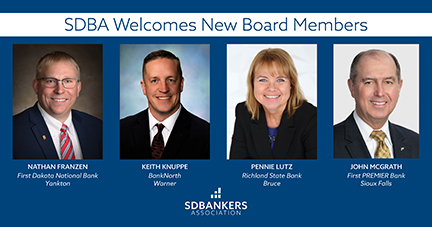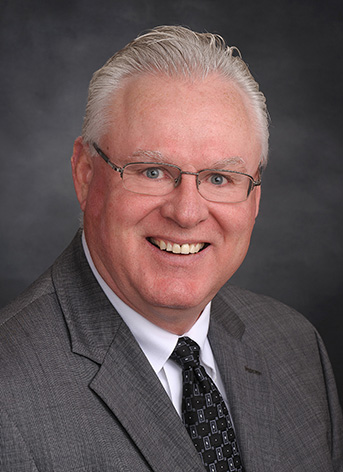- Education & Events
- Advocacy
- Products & Services
- Membership
- Resources
- SDBANKER Magazine
- SDBA eNews
- SDBA eNews Archives
- Legislative Update/Bill Watch
- South Dakota Bank Directory
- Women in Banking
- Scenes of South Dakota Calendar*
- Holiday Signs
- Regulatory Report
- South Dakota Banking Code
- Record Retention Manual
- Advertising & Sponsorship Guide
- COVID-19 Resources
- Mental Health and Crisis Prevention
- About
|
SDBA Welcomes Four New Board Members
The SDBA recently held elections for three of the 10 seats on its Board of Directors. Elected to serve on the SDBA Board of Directors were:
This is Franzen, Knuppe and Lutz’s first term on the SDBA Board of Directors. They started their three-year terms on May 1, 2021. Read more about Franzen, Knuppe and Lutz. In addition, John McGrath, SVP - chief credit officer, First PREMIER Bank, Sioux Falls, has been appointed to the SDBA Board of Directors. SDBA Chair Steve Bumann, BankWest, Pierre, appointed McGrath to fill a vacant seat on the SDBA Board of Directors through April 30, 2022. Read more about McGrath. See the full list of SDBA Board of Directors. Chuck Hegerfeld Appointed to UBB Boards
Hegerfeld has been president and CEO of BankStar Financial since 1998. He brings more than 30 years of bank management experience and is a graduate of South Dakota State University and the Graduate School of Banking at Colorado. Hegerfeld is a member of the South Dakota Bankers Insurance & Services (SDBIS) Inc. Board of Directors, an officer and director at Elkton Development Corporation, and is involved in various local community and nonprofit organizations. In addition, Ann Hengel was also appointed to serve on the UBBI and UBB Boards of Directors. Hengel brings more than 44 years of banking experience, and her vast industry knowledge includes managing governance, risk and compliance functions in senior executive team positions, with her most recent position as chief risk officer for Bremer Bank, St. Paul, Minn. Headquartered in Bloomington, Minn., United Bankers’ Bank, an SDBA associate member, is a full service provider of correspondent banking services serving more than 1,000 community banks from the West Coast to the Great Lakes and South Atlantic. Read more.
Quad States Convention Early Bird Registration Ends FridayIf you haven’t yet registered to attend the 2021 Quad States Convention on June 14-15 in Rapid City, S.D., the early bird deadline to register is Friday, May 14. The South Dakota Bankers Association invites you to celebrate all that we have accomplished this past year as we REIMAGINE, REINVENT and REVOLUTIONIZE in A NEW DIRECTION at the 2021 Quad States Convention. This year’s event will include bankers and business partners from South Dakota, North Dakota, Montana and Wyoming. We are hosting a live event in Rapid City and will also livestream speakers for those who are unable to or prefer not to attend in person. Masks will be strongly encouraged at the event, as well as social distancing. See the convention agenda and register to attend. Those registering to attend can be invoiced. Questions, contact the SDBA at [email protected] or 605.224.1653. ABA Slams Fed's Proposal to Re-Open Durbin Amendment RulemakingAmid substantial growth in online purchases in recent years, the Federal Reserve last Friday reopened its rule on the Durbin Amendment. Specifically, the Fed issued a proposal that would amend Regulation II, which implements Durbin, to apply the requirement that debit card transactions be able to be processed on at least two unaffiliated payment card networks—for example, a PIN debit and a signature debit network—to card-not-present transactions, which have grown from 10% of debit purchases in 2009 to 23% in 2019. When the Fed first issued Reg II, “the market had not developed solutions to broadly support multiple networks over which merchants could choose to route [CNP] transactions,” the Fed said, noting that technology has since evolved to address these issues. “Despite these developments, and in contrast to the routing choice that currently exists for card-present transactions, merchants are often not able to choose from at least two unaffiliated networks when routing card-not-present transactions, according to data collected by the Board and information from industry participants,” the Fed said. However, ABA and several trade associations last Friday warned that revisiting the “flawed from the beginning” Durbin Amendment would make it harder for banks to deliver low transaction prices to acquirers and consumers. “The Fed's decision to revisit Reg II risks causing even further consumer harm,” the groups said. “The Fed's own study of debit card transactions, both in person and online, shows that merchants and consumers are increasingly benefitting from significant investments in innovation and fraud detection embedded in the nation's payment rails today. By reopening the rules surrounding debit card transactions, the Fed could put the convenience, safety and security that Americans have come to expect when they use their debit card at risk. We will vigorously oppose any attempt to undermine the payments system at the expense of consumers.” The proposal would also clarify that the debit card issuer is responsible for ensuring at least two unaffiliated networks have been enabled and would standardize and clarify certain terms and phrases in the Fed’s Reg II commentary. Comments are due 60 days after the rule is published in the Federal Register.
Senate Votes to Repeal OCC 'True Lender' RuleThe Senate on Tuesday voted 52 to 47 to repeal the OCC’s “true lender” rule using a Congressional Review Act resolution. The rule, finalized in 2020, established a test to determine when a bank is considered the true lender on a loan made in a partnership with a nonbank entity. The ABA expressed its disappointment with the Senate action. “We share the view that this rule could be improved and support changes,” said ABA EVP James Ballentine. “By employing the blunt instrument of the Congressional Review Act to reject this rule, however, the Senate is effectively preventing any similar, improved rule from ever being promulgated.” Under the Congressional Review Act, a resolution that receives simple majorities in each house of Congress and the President’s signature may overturn regulations finalized within the previous 60 days Congress is in session. A resolution using this procedure also prohibits the agency in question from reissuing a substantially similar rule. “We urge the House to consider the long-term ramifications for consumers and innovation that rejecting this rule would create,” Ballentine added. “We believe that responsible innovation in financial services holds tremendous potential to expand access to fair and affordable credit, particularly for unbanked and underbanked consumers. Let's improve this rule instead of turning back the clock.”
McWilliams: FDIC to Seek Comments on Digital AssetsThe FDIC in the coming days will issue a request for information seeking additional information on how banks are using or planning to use digital assets, and “what, if anything, the FDIC should be doing in this space,” FDIC Chairman Jelena McWilliams said in remarks during a legal issues conference on Tuesday. “In light of the rapid pace of technological change worldwide, including by countries who are not saddled with legacy systems that can slow the adoption of new technologies, the challenge for regulators is to create an environment in which fintechs and banks can collaborate and in which banks are given the space and opportunity to pursue innovative solutions for their customers,” McWilliams said. She also recapped the banking industry’s performance during the pandemic, emphasizing that FDIC-insured banks performed well during the period of extreme volatility. Notably, McWilliams said that there were just three bank failures during the pandemic and that none of those were due to the pandemic or ensuing economic stress. Read more. Trade Groups Urge Lawmakers to Rethink New Reporting RequirementsAhead of a Senate Finance subcommittee hearing on Tuesday on shrinking the tax gap, the ABA and seven other financial trade associations cautioned lawmakers about creating new reporting requirements for banks that would “impose cost and complexity that are not justified by the potential, and highly uncertain, benefits.” Such a proposal was included in President Biden’s American Families Plan, which called for financial institutions to report information on account flows, including earnings from investments and business activity. The groups emphasized that financial institutions already have robust reporting responsibilities and that creating a new reporting structure would be a complex undertaking. “[A]s the Subcommittee begins to consider the feasibility and advisability of this proposal, we encourage you to carefully assess the costs and benefits of imposing a new level of bureaucracy and personal data collection on our already over-complicated tax reporting structure,” the groups wrote. They added that “strengthening IRS funding to facilitate targeted auditing of questionable tax returns is a much more efficient and effective approach to closing the tax gap.” Read the letter. For more information, contact ABA’s John Kinsella.
Learn How to Implement a Successful Marketing StrategyFinding the right marketing tactics for your bank can be a challenge, even more so with a limited budget and competitive ecosystem. How do you differentiate your bank from the others in your market? We know that it takes many touchpoints with a brand for a consumer to make a buying decision, so how do you ensure your bank is there when your future customer is ready to make a decision? Learn how you can implement a successful marketing strategy that builds your bank’s digital presence and drives real results by attending the Virtual Marketing Seminar: Winning New Customers in Times of Change on June 8. This day-long training, which is being held by the North Carolina Bankers Association, will cover five parts of winning new customers. The cost for the virtual seminar is $300. Learn more and register.
Question of the Week
Question: We have two consumers applying for a mortgage jointly and have provided the same email address for each applicant. The bank complies with TRID disclosures electronically, how should the bank ensure that each consumer received the disclosure, since the email addresses are the same (does the bank email each disclosure twice or require two confirmations?) Answer: Regulation Z, § 1026.17(d) and Commentary 2 govern disclosures to multiple consumers. When two consumers are joint obligors with primarily liability on an obligation, the disclosures can be given to either one of them if the bank chooses. Merely being a guarantor or surety to the loan does not require the consumer to receive the disclosures. It is always important to remember any internal policy or investor requirements as this may differ. The Regulation does require each consumer to receive disclosures when: (1) the transaction is subject to the right of rescission; and (2) each consumer must receive the disclosures who has a right to rescind. Therefore, for a transaction that is not subject to a right of rescission, it is sufficient that the primary applicant confirms receipt of the disclosure. It is always important to remember E-Sign requirements when complying with providing TRID disclosures electronically. Compliance Alliance’s E-Sign toolkit is very helpful to assist with those obligations: https://compliancealliance.com/find-a-tool/by-toolkit/e-sign. Not a member? Learn more about membership with Compliance Alliance by attending one of our live demos: Compliance Alliance offers a comprehensive suite of compliance management solutions. To learn how to put them to work for your bank, call 888.353.3933 or email and ask for our Membership Team. For timely compliance updates, subscribe to Bankers Alliance’s email newsletters. SDBA eNews Archive Advertising Opportunity Questions/Comments |



 Chuck Hegerfeld, BankStar Financial, Elkton, has been appointed to the United Bankers’ Bancorporation, Inc. (UBBI) and United Bankers’ Bank (UBB) Boards of Directors.
Chuck Hegerfeld, BankStar Financial, Elkton, has been appointed to the United Bankers’ Bancorporation, Inc. (UBBI) and United Bankers’ Bank (UBB) Boards of Directors.
